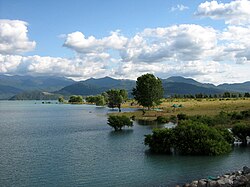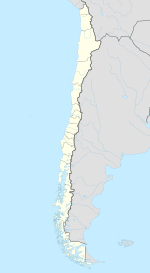Linares Province
| Linares | |||||
|---|---|---|---|---|---|
| Province | |||||

Lake Colbun
|
|||||
|
|||||
| Coordinates: 35°50′S 71°35′W / 35.833°S 71.583°WCoordinates: 35°50′S 71°35′W / 35.833°S 71.583°W | |||||
| Country | Chile | ||||
| Region | Maule | ||||
| Capital | Linares | ||||
| Communes |
List of 8:
|
||||
| Government | |||||
| • Type | Provincial | ||||
| Area | |||||
| • Total | 10,050.2 km2 (3,880.4 sq mi) | ||||
| Population (2012 Census) | |||||
| • Total | 264,292 | ||||
| • Density | 26/km2 (68/sq mi) | ||||
| • Urban | 139,742 | ||||
| • Rural | 114,248 | ||||
| Sex | |||||
| • Men | 127,063 | ||||
| • Women | 126,927 | ||||
| Time zone | CLT (UTC-4) | ||||
| • Summer (DST) | CLST (UTC-3) | ||||
| Area code(s) | 56 + 73 | ||||
| Website | Governorate of Linares | ||||
Linares (Spanish: Provincia de Linares) is one of four provinces of the central Chilean region of Maule (VII). The provincial capital and most populous center is the city of Linares.
As a province, Cachapoal is a second-level administrative division of Chile, governed by a provincial governor who is appointed by the president. The provincial governor is Luis Suazo Roca.
The province comprises eight communes, each governed by a municipality consisting of an alcalde and municipal council.
The province is located at the very center of mainland Chile, and its capital lies 303 km south of Santiago and 50 km south of Talca, the regional capital, in the middle of a rich agricultural and wine-growing area. According to the 2002 census by the National Statistics Institute (INE), the province spans an area of 10,041.2 km2 (3,877 sq mi) and had a population of 270,990 inhabitants (127,063 men and 126,927 women), giving it a population density of 25.3/km2 (66/sq mi). Between the 1992 and 2002 censuses, the population grew by 3.1% (7,699 persons). Forty five percent of the population of the province live in rural areas, as compared with 33% in the Maule Region and 13% in Chile as a whole. This characteristic gives Linares a special cultural and socioeconomic profile among the Chilean provinces.
Linares has a mild Mediterranean climate. The summers are hot and mainly dry (November to March) with temperatures reaching up to 32 degrees Celsius on the hottest days. The winters (late May to mid September) tend to be rather humid and rainy, with typical maximum daily temperatures of 15 degrees Celsius, and minimum just above freezing. The rainfall is more abundant in the eastern as well as the southern part of the province (Parral), and the effects of this are seen in the good conditions for rice cultivation in the latter area. Irrigation is used to a large extent.
...
Wikipedia



